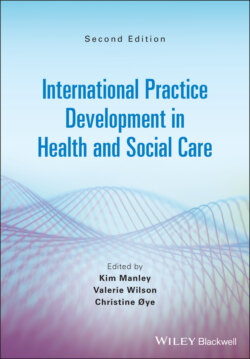Читать книгу International Practice Development in Health and Social Care - Группа авторов - Страница 41
Facilitation – Crystal’s unrecognised talent
ОглавлениеWe can see from Cathy’s account that facilitation is a key component of PD implementation in any setting. The evidence for a practice improvement or service redesign, the opportunity for the change and the organisational readiness are significant enablers of the process. Their success, however, will be influenced by sound facilitation skills of the transformational leaders engaged in supporting participants through the process. These leaders will have a focus on building relationships that identify and utilise the skills of the many and encourage curiosity and creativity in the process (see Chapters 12 and 13 for more on this). The facilitators themselves can benefit from being active learners and examining their own practice, beliefs and values to move to developing others in the same process. My experience demonstrates the journey from clinical midwife to committed, experienced and authentic PD facilitator (see Chapters 10 and 11 for more on facilitation development).
After many years working as a clinical midwife, I was drawn into the world of improvement through an invitation to implement the Productive Ward programme: ‘Releasing Time to Care’. This programme encouraged teams to look at waste within existing ward processes and make changes to improve safety, effectiveness and person‐centredness. This was the first time that I experienced the power of the patient voice; of using qualitative as well as quantitative measures of improvement. It was also the first time that I felt that a true board to ward approach to change was embraced and evaluated.
My transformation came from being tasked with delivering this programme, but without the training, tools or methodologies to draw from. I knew what needed to be delivered and was left to define the why and how with the teams and individuals in the programme. Working with colleagues we embarked on this privileged journey of embedding sustainable change but also learning about self and others. We implemented the programme successfully across 52 diverse clinical areas. One participant stated:
‘Being part of the Productive Ward programme has made me look at everything differently and inspired me to get involved in supporting greater change and share the skills I’ve learnt with others.’
(ITU nurse)
Active work‐based learning facilitated my transformation and was my turning point, where I truly recognised and understood transformational PD facilitation. I had developed skills in this methodology which I could now underpin with a name, formal training and tools which further validated what I had been doing. I had been transformed to think, do and be different, which in turn enhanced my confidence in my ability to facilitate.
I recognised that a shared purpose that draws teams together in a common direction is a vital starting point for effective change and improved workplace cultures. I learned that listening with intent provides a sense of authenticity and an appreciation by the participant that they are truly being heard. I learned that asking enabling questions and supporting teams and individuals to reflect and explore their own ideas and solutions leads to greater engagement and therefore sustainable change. I found that in leading and facilitating high‐challenge conversations and ways of working combined with high support I could enable people to challenge ways of working and behaviours, and free them to explore new ideas. The importance of giving feedback in a constructive way promoted creative thinking and how to receive feedback without feeling defensive. These active learning skills laid the foundation of my facilitation practice going forward.
Enabling effective workplace cultures through role modelling and facilitating active work‐based learning has been core to our maternity transformation programme. This work was the starting point for establishing trusting relationships with staff in which they were freed to share their existing ways of working and future change ideas. The values clarification contributions were drawn into a conceptual framework, identifying both the ultimate purpose and how the community midwifery team could focus on improvement areas of work by thematically analysing comments into enablers, inhibitors and consequences of best practice services.
Presenting these findings to the leadership team was heralded as ‘true transformation’. Some change ideas were approved immediately, including the required equipment that midwives said was essential for them to carry out their roles effectively. The staff appreciated this different approach where their feedback was valued, and that they had been empowered to implement grassroots improvement. This was the start of developing a positive workplace culture. Simple but powerful tools that you could apply to your own workplace that have lasting impacts and bring something magical. The contributions from this foundational piece of work informed development of the full maternity Transformation Programme that can be traced back to the original thematic analysis of participants’ comments; this demonstrated true authenticity.
Understanding our own staff, women and organisational demands and priorities for improvement and aligning these to the national direction was key to ensure engagement and ownership (National Maternity Review 2016). Working with and supporting staff to lead on areas of transformation using the workplace as the main source of learning was key to building the programme and enabling change to progress.
In the ideal world, PD methodology would be implemented and embedded in usual workplace business throughout hospitals and maternity teams. Role modelling and visibility of the principles of PD actioned in clinical practice settings can produce change over time. The core improvement team on this programme continue to live and role model the PD principles, facilitating workplace learning and co‐production events with women and our maternity partners at every opportunity. They promote change that is aligned to a shared vision and purpose and aim to grow the critical mass of people with PD facilitation skills.
I hope that my experience has shown that PD can comfortably sit together amongst other methodologies that you may be using, but will add something truly transformational through supporting the development of effective workplace cultures that are person‐centred and safe.
